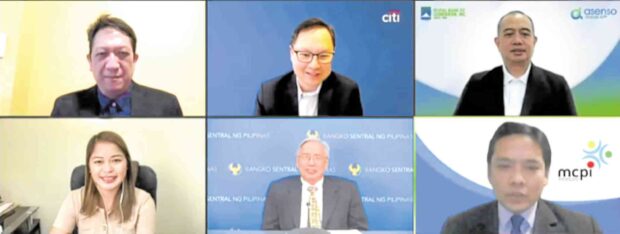
AWARDS LAUNCH (From left, top) MCPI chair Gilbert Maramba, Citi Philippines CEO Paul Favila, first DFIA MFI winner Rural Bank of Guinobatan president Paulo Honrado, (bottom) first DFIA microentrepreneur digital champion Lorie Jane Almazora, BSP Governor Felipe Medalla and MCPI executive director Allan Sicat —Contributed PHOTO
Digitalization remains a major strategy for promoting financial inclusion in the Philippines.
Thus says Governor Felipe Medalla of the Bangko Sentral ng Pilipinas (BSP) to stress the significance of the ongoing second annual search for Digital Financial Inclusion Awards (DFIA) recipients.
The awards program, an updated version of the Citi Microentrepreneurship Award (CMA), aims to strengthen financial inclusion through digitalization in Philippine microfinance. Like CMA, it is funded by Citi Foundation and undertaken in partnership with the Microfinance Council of the Philippines Inc. (MCPI) and supported by Citi Philippines and BSP.
DFIA will shine the spotlight on the “role of microfinance institutions (MFIs) in expanding digital financial services to poor households.” It will also honor outstanding microentrepreneurs that have incorporated digital solutions in the products or services that they provide.
Four MFIs and 20 microentrepreneurs will receive the DFIA. Each award winner will get P100,000. Microentrepreneur awardees will also get laptops to help them scale up their operations.
DFIA recipients will be formally honored in virtual ceremonies in October.
Medalla says the DFIA program is “very much aligned” with the central bank’s drive for financial inclusion. He stresses that the BSP is “steadfast in pursuing digitalization efforts.”
The new award program will highlight inclusive financial upgrade and microfinance, he adds.
Digitalization is expected to strengthen financial inclusion and enable more microentrepreneurs and MFIs to survive and expand after the upheaval caused by the COVID-19 pandemic.
New Citi Philippines CEO and head Paul Favila points out that the global financial group has, for more than 20 years, worked with similarly minded groups to “champion and honor microentrepreneurs.”
The initiative, he says, is in pursuit of Citi’s goal to make a positive impact on the communities it serves.
As the updated version of CMA, Favila says DFIA aims to create the next generation of MFIs and “help create economically vibrant and resilient communities.”
Gilbert Maramba, MCPI chair, says digitalization “served a major role in the survival and growth” of both MFIs and microentrepreneurs during the pandemic.
Paulo Honrado, president of the Rural Bank of Guinobatan Inc. in Albay, says the disruption resulting from COVID-19 made their digital transformation inevitable. The bank, which has many microentrepreneur borrowers, had to develop its own mobile application to reach its clients.
“Engaging in microfinance entails a lot of work,” he says, “but digitalization reduced manual labor.”
Honrado proudly declares that he now has a “rural bank with the capabilities of a big bank” and this growth and success “was partly due to digitalization.”
Both Medalla and Favila, who describe the first DFIA an “astounding success,” hope this year’s event would be bigger.
The DFIA recipients will be chosen by a panel composed of the BSP governor, Citi CEO and representatives of media, academe, private/business sector and public sector. —Contributed INQ